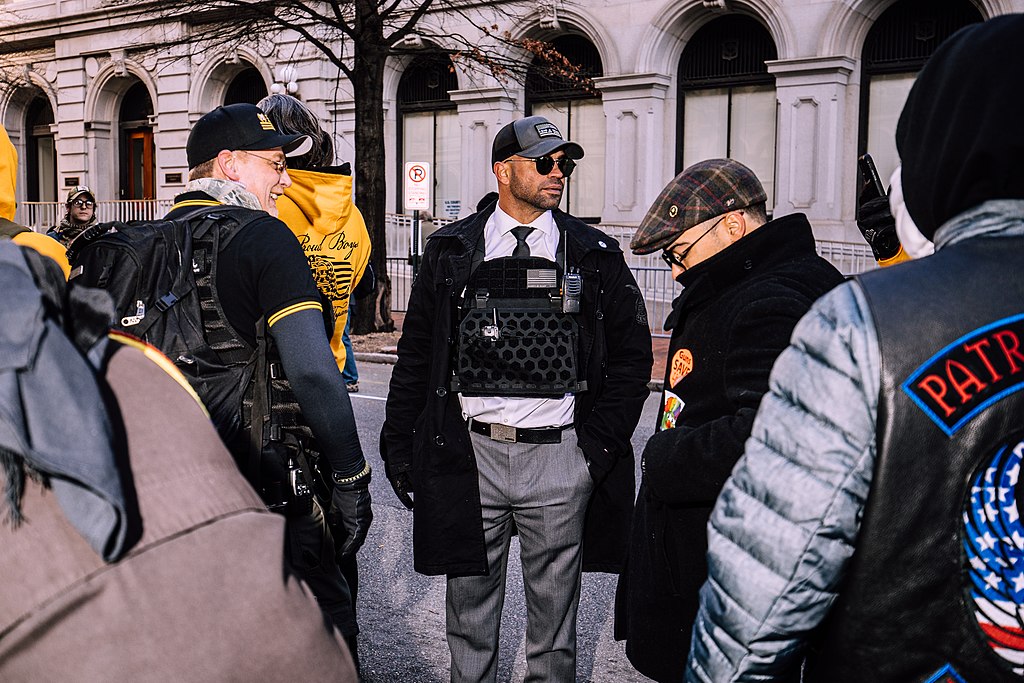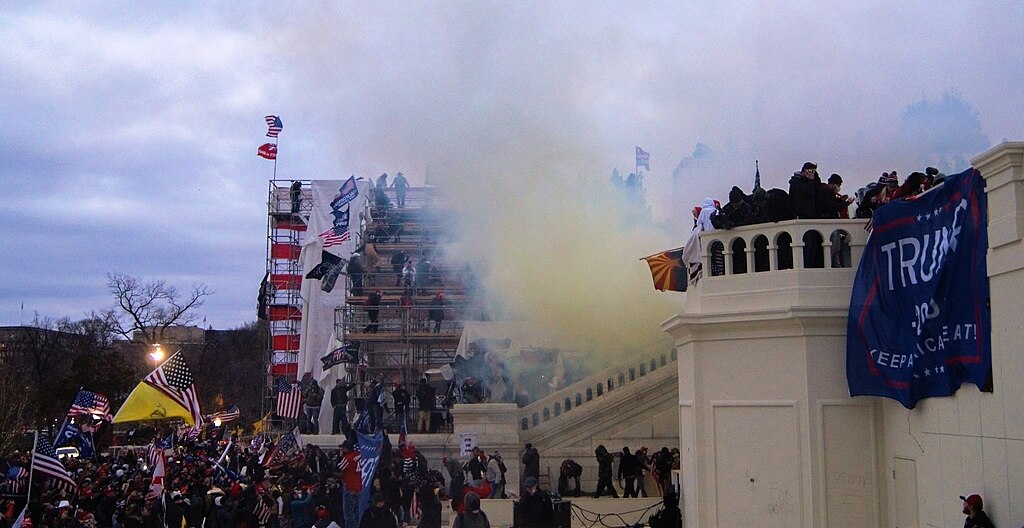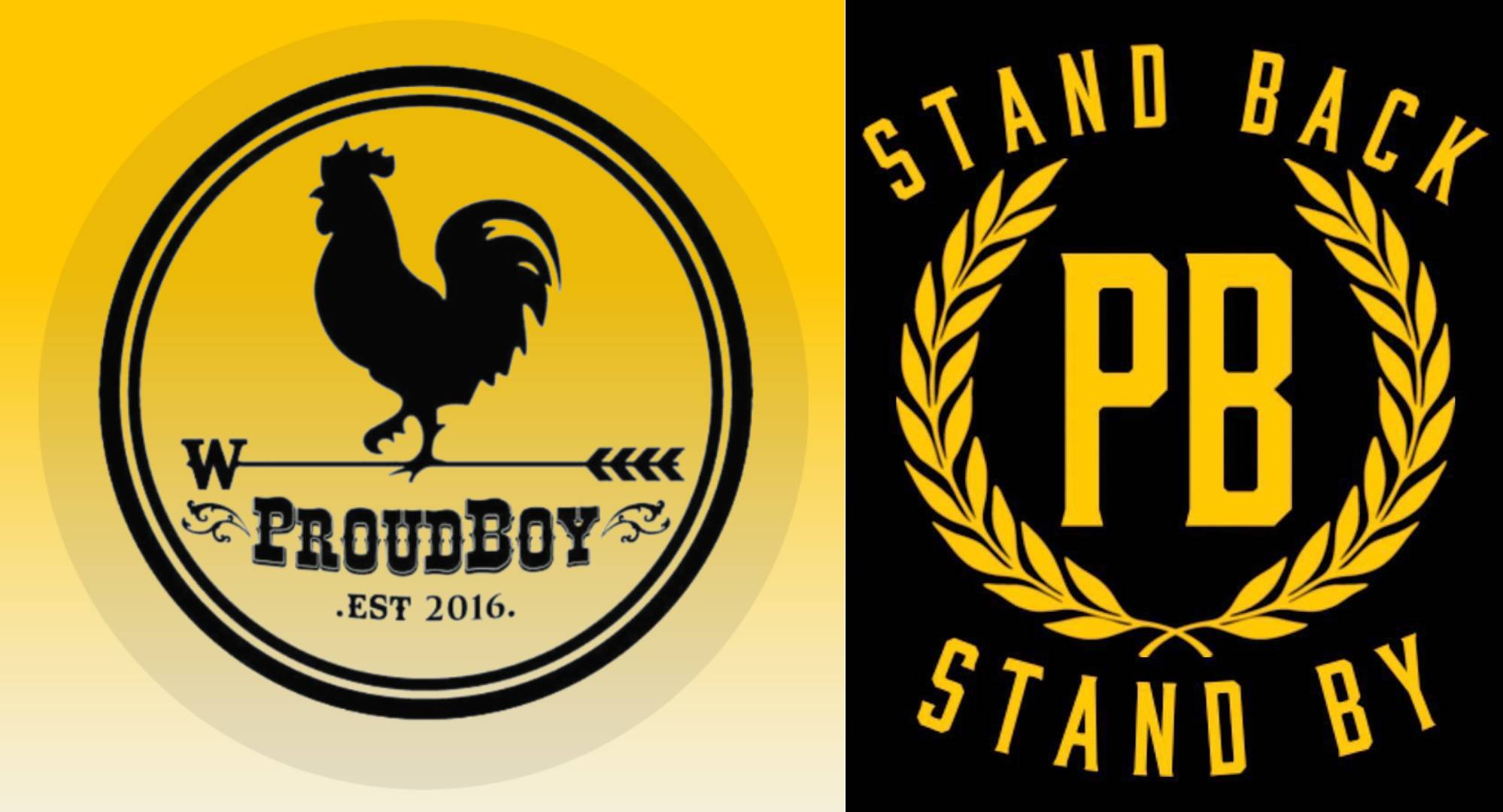Proud Boys
The Proud Boys are a US-based political activist group that emerged in 2016 and subscribes to a self-described “Western chauvinist” worldview that claims the inherent superiority of Western societies — particularly ones that are majority white and Christian — over all others. Members have been involved in a range of harmful and illegal activities. These include:
- Repeated violence against the group’s perceived political opponents, particularly those who members claim to be “antifa.”
- Harassment and intimidation of the group’s critics on social media and in the news media.
- Harboring members with extremist ideological beliefs, including white supremacist and antisemitic views, and violent criminal histories.
- Networking and overlapping with other extremist groups including self-styled anti-government “militia” groups, ultra-nationalist far-right skinhead groups, and racially motivated extremist groups.
- Perpetuation of far-right conspiracy theories and hateful narratives that target Democratic officials, LGBTQ+ communities, religious minorities, and immigrants.
This Explainer sets out the group’s evolution from its founding to the present. It also identifies some of the Proud Boys’ core beliefs and its distinctive iconography.
Origins and Evolution
The Proud Boys have evolved their priorities and political strategies over time, coinciding with changes in their leadership and organizational structure. At their pinnacle, the group adhered to a clear hierarchy: regional chapters reported to a council of national leaders, who set priorities and expectations for the group and its members. But legal challenges and increased law enforcement scrutiny caused the Proud Boys to fracture in recent years, and many chapters now operate with a large degree of autonomy. Most chapters have turned their focuses to local political issues, and many of the Proud Boys’ most–radicalized members have appeared to break off into adjacent extremist groups.
Gavin McInnes (2016-2018)
The Proud Boys were founded in 2016 by far-right Canadian media personality Gavin McInnes. His official announcement came in Taki’s Magazine, a digital outlet that frequently published racist articles and white nationalist writers. McInnes described the group as a “bona fide men’s club” which men were joining around the world out of mutual disdain for “politically correct culture.”
McInnes stated that early meetings usually consisted of “drinking, fighting, and reading aloud” from paleoconservative writer Pat Buchanan’s 2002 book “Death of the West” – a racist diatribe about “the vanishing white race and … the death of our culture and civilization.” The Proud Boys invited men from “all races, religions, and sexual preferences” to join their ranks. However, they had to align with their “Western chauvinist” ideology, which champions Western cultures that are predominantly white and Christian, and to agree that “white men are not the problem” with society. They were unflinching supporters of President Donald Trump. (“How can you not if you’re a Proud Boy?” the group’s website rhetorically asked.)
“Western chauvinism” as defined by the Proud Boys claims that Western societies (like those in Europe, North America, Australia, and New Zealand) are inherently superior to other global regions and cultures. The group largely idealizes Western society as a majority white, Christian, and patriarchal social order, and Proud Boys cite that vision to justify a host of prejudices against racial and ethnic minority groups, women, and LGBTQ+ communities.
Members accompanied their ideological alignment with large doses of self-deprecating parody, not dissimilar to McInnes’ media persona. The group derived its name from a song in the animated musical “Aladdin”; members called out to each other with the Swahili word “Uhuru” (“freedom”) that McInnes said they learned from collectively mocking a YouTube video about white people paying reparations. They established “degrees” of membership which resembled hazing. One such test involved shouting the names of breakfast cereals while being punched. Another was pledging not to consume pornography more than once a month or ejaculate less than a yard away from a woman.
Throughout the next year, Proud Boys members grew more politically active. They appeared at anti-Muslim political demonstrations alongside anti-government extremist groups such as the Oath Keepers. They also engaged in violent clashes with political opponents at events in New York, California and Washington, DC. A new “fourth degree” of membership was instated to award individuals who engaged in “a major conflict for the cause,” including “serious physical fights”. Members discussed perceived political enemies with increasingly racist and violent rhetoric.
In 2017, then-members Kyle Chapman and Augustus Sol Invictus formed a paramilitary wing of the Proud Boys called the “Fraternal Order of Alt-Knights (FOAK).” They described it as a “tactical defense arm” of the group that would confront anti-fascist protesters, often violently. The Alt-Knights attracted individuals with violent criminal histories and links to racial supremacist movement groups that saw violence as a necessity to advance the Proud Boys’ ostensibly pro-Western cause.
Members of the Alt-Knights attended the deadly Unite the Right white supremacist gathering in Charlottesville, Virginia in 2017; one of the primary organizers of the event was former Proud Boy Jason Kessler. After a white supremacist participant murdered a counter-protester, McInnes disavowed the event. While the founder has repeatedly sought to distance the Proud Boys’ public image from the white supremacist alt-right, Proud Boys have joined violent far-right protests alongside racist activists on multiple occasions.
The Proud Boys’ defining features became a close proximity to white supremacists and an affinity for violence against the MAGA movement’s political opponents – particularly those they defined as “antifa”. Mainstream platforms and tech companies including Meta, Twitter and PayPal banned the Proud Boys and McInnes from their services, citing rules against hate groups and promoting violence.
The US government first classified the Proud Boys as an extremist group in late 2018, prompting McInnes to step down as the group’s chairman. McInnes said he believed that doing so “could help alleviate” the prosecution of 10 members facing jail time following a violent brawl with anti-fascist protesters in New York City.
While McInnes said he hoped this would demonstrate to jurors that “they are not dealing with a gang and there is no head of operations”, he described the Proud Boys as “a gang” in a 2017 interview with podcaster Joe Rogan. In a video from 2018, McInnes said that the move was “100% a legal gesture, and it is 100% about alleviating sentencing.”
Shortly after McInnes stepped down, the group appointed its attorney Jason Lee Van Dyke as its new chairman. His tenure as chairman lasted just two days, ending abruptly after Van Dyke accidentally revealed the identities of senior members when publishing updated bylaws for the group. (Prosecutors would later accuse Van Dyke of ordering the Arizona Proud Boys to surveil a man he wanted to murder.)
The group’s next chairman was Enrique Tarrio, head of a Proud Boys chapter in Miami, Florida and an attendee of the Unite the Right rally with the Alt-Knights.
Enrique Tarrio (2018-2021)
Tarrio assumed leadership of the Proud Boys amid a public image crisis and sought to transform its image within mainstream Republican politics. His tenure began with the group continuing to appear at far-right protests, engaging in violence against political opponents and menacing their critics; at the same time, some members were facing legal consequences for their actions.
Under Tarrio, the Proud Boys leaned into their aggressive public image. They sought to portray themselves to Trump supporters as misunderstood misfits who were defending conservatives’ free speech from violent far-left radicals. Tarrio made frequent appearances in the news media to defend the group’s behavior. He also represented the group at mainstream political events, including the flagship Conservative Political Action Conference in Washington, DC.

Enrique Tarrio and members of the Proud Boys appear at a gun rights rally in Richmond, Virginia, on January 20, 2020. Photo via Wikimedia Commons.
In 2020, Proud Boys appeared at several protests held outside state capitals and vote-counting locations in response to COVID-19 lockdowns. Members also antagonized Black Lives Matter protests in several states. Proud Boys, dressed in their distinctive black and yellow, were spotted at Trump rallies. As mainstream tech companies continued to enact bans against the group, members embraced alternative platforms popular with other Trump supporters including Parler and Telegram.
During the first presidential debate in 2020, Trump gave a seemingly supportive statement about the Proud Boys. When asked whether he would disavow extremist groups that supported him, he said “Proud Boys, stand back and stand by.” Although Trump later walked back his comment and denied knowing who the Proud Boys were, the group spun his comments as an endorsement.
The Proud Boys played an instrumental role in the election denialist protest movement known as “Stop the Steal” after President Joe Biden defeated Trump in the 2020 election. According to Tarrio, the Trump campaign had asked the Proud Boys to participate in those protests. Many of the group’s members appeared at rallies and behaved as a private security force for the events’ participants and speakers. Hundreds of Proud Boys, including some who engaged in violent clashes and destroyed property, paraded through election-denialist events in Washington, DC.
On January 6, 2021, Proud Boys played instrumental roles in escalating the violent riot at the US Capitol Building meant to stop the certification of President Biden’s electoral win. In the wake of the Capitol riot, police arrested several high-profile members. More tech platforms, including e-commerce services, also banned the group and its affiliates from their services. This combination left the Proud Boys under severe financial and political pressure with members becoming increasingly paranoid about legal cases against them under Biden’s administration.
National Proud Boys leaders asked members to observe a hiatus from attending political events after the Capitol riot, which most chapters obliged, for an extended period. During this time, several Proud Boys chapters withdrew from the national organization after news outlets reported that Tarrio worked as a “prolific” informant for law enforcement before joining the group. The Proud Boys fractured as chapters argued about ideology, strategy and organization, while members grew suspicious of their leaders and of each other.
Later that year, Tarrio resigned as chairman and said the Proud Boys would pivot to local politics, abandoning their national political ambitions. In March 2022, Tarrio was charged and eventually sentenced to 22 years in prison for crimes related to the Capitol riot.
Decentralized (2021-present)
Law enforcement investigations and a greater focus on domestic terrorism after the Capitol riot led extremist movement groups to splinter and recalibrate their political ambitions. After the riot, officials in Canada and New Zealand designated the Proud Boys a terrorist group.

The United States Capitol on 6 January 2021. Photo via Wikimedia Commons.
When some chapters of the Proud Boys became politically active again, their focus was largely directed toward local entities reflecting national “culture war” issues including COVID-19 policies, school boards and LGBTQ+ events. These events were organized independently of any national command structure. Some offshoots embraced more explicit extremist ideologies and networked with racial supremacist groups. A small number of members ran for elected political positions, albeit unsuccessfully, and some sought to influence local Republican Party offices.
As self-governing entities, Proud Boys chapters today vary in their ideological intensity and political participation. There are currently two warring factions: a “Traditional” or “National” wing that seeks to reconstitute the group’s prior organizational structures and political postures, and a “Rogue” or “Standard” wing that harbors more extreme beliefs and seeks to maintain chapter independence.
In 2023, this rift erupted into a fight between Proud Boys in Oregon and members of a neo-Nazi group. The ongoing disputes also reportedly prompted a brawl between Proud Boys members who gathered for an event in Las Vegas, Nevada in 2024.
The infighting has left Proud Boys unable to mobilize their members at the frequency or scale they could muster prior to the Capitol riot. Efforts to direct the group today have been met with mixed success. For example, National leaders failed to discourage dozens of Proud Boys from marching in Washington, DC during Trump’s 2025 inauguration to call on Trump to pardon their group members – the first major showing of the group in the city since the Capitol riot.
Despite the misgivings on the part of the National faction, Tarrio and other Proud Boys members were among the Capitol rioters pardoned by President Trump at the start of his term.
Though the organization is still largely divided, chapters unanimously thanked the president for freeing their members from prison. Some pardoned Proud Boys members have since discussed their ambitions to seek political positions or to form new organizations, but few of their aspirations have materialized. After Trump pardoned Capitol riot defendants, Proud Boys chapters frequently posted recruitment messages on their online profiles, though the success of those efforts is unknown. At the time of writing, there are no apparent plans to reorganize the Proud Boys under their previous leadership structure.
Iconography
Black and gold: Proud Boys often wear black and yellow during public demonstrations. They frequently dressed in Fred Perry polo shirts before the company withdrew the style from their catalogue in 2020. Black and gold are reflected across other Proud Boys imagery, including logos and websites.
Logos: The Proud Boys have a host of national-level logos, and each chapter typically employs its own unique iconography. Most are colored black and gold, some borrow symbols, like roosters, and many contain the name of the group or the initials “PB.”

Two Proud Boys logos, both of which use their black and gold color scheme.
Catchphrases: Proud Boys members refer to each other with a mix of slogans and in-group speak, some of which include:
- “POYB”: A reference to the song from Disney’s Aladdin which gave the group its name, “Proud of Your Boy.”
- “Uhuru!”: A Swahili word meaning “freedom,” which group members adopted from a YouTube video they collectively mocked that discussed white people paying reparations.
- “FAFO”: An acronym that stands for “Fuck Around and Find Out.” Though the phrase is not limited to Proud Boys chapters, it is often used by them in the context of justifying street brawls that members engage in.
- “West is the Best”: A slogan referring to the Proud Boys’ belief that predominantly white and Christian Western societies are inherently superior to other global cultures.
Further Reading
Pride & Prejudice: The Violent Evolution of the Proud Boys – Combating Terrorism Center (CTC) at West Point
Riding the Tide: The Shifting Identity of the Proud Boys Since the Capitol Riot – Armed Conflict Location & Event Data (ACLED)
Proud Boys – Southern Poverty Law Center (SPLC)



